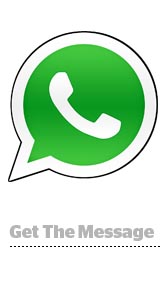Facebook will acquire mobile messaging service WhatsApp in a deal worth $16 billion – $4 billion in cash and approximately $12 billion in Facebook shares.
Factoring in an additional $3 billion employee stock grant that will vest over four years, the deal value is more than 10% of Facebook’s approximately $173 billion market cap, and makes the $1 billion Instagram acquisition look paltry by comparison.
This is not an ad play, both Facebook CEO Mark Zuckerberg and WhatsApp CEO Jan Koum made clear in a conference call with press and investors. “I don’t personally think ads are the right way to monetize messaging services,” Zuckerberg said.
Rather WhatsApp will continue to monetize through a subscription model that currently offers one year of free service, followed by a $0.99 annual charge.
But that’s not to say the deal has no advertising implications.
With the buy Facebook gets a rapidly growing and highly engaged install base of more than 450 million monthly users around the world, 70% of whom are active on a given day. It has experienced strong growth in Europe, India and other Asia locales where Facebook has sometimes struggled to gain a foothold. What’s more, WhatsApp is adding more than 1 million new users each day, and Facebook management expects its users to surpass 1 billion in time.
What this means from an audience and addressability standpoint remains to be seen, but it’s not hard to envision the WhatsApp platform being part of a global identity solution integrated with ad supported services such as the core Facebook social media product and multimedia sharing platforms.
Alternatively, the deal can be seen as a defensive move to prevent a rapidly growing messaging service – one that is benefiting from global network effects – from ultimately disrupting the business.
“Facebook is trying to dominate the messenger market,” said Michael Oiknine, CEO of Facebook ads partner Apsalar. “Their Messenger app is not getting the explosive traction they hoped for. WhatsApp, on the other hand, is showing an impressive and accelerating growth, which could disrupt Facebook ultimately.”
Facebook has lately shifted its strategy to emphasize standalone services that serve to enable connections and sharing between people, with varying degrees of privacy controls.
The WhatsApp buy is consistent with that vision and with Zuckerberg’s stated plans to develop and acquire platforms outside the core Facebook experience.
“We want to … build a handful of great experiences that are separate from what you think of as Facebook today,” he said on the company’s Q4 2013 earnings call last month.
As with Instagram, Facebook intends to give WhatsApp as much autonomy it needs to execute on its road map. In its statement Wednesday, Facebook said the company “fosters an environment where independent-minded entrepreneurs can build companies, set their own direction and focus on growth while also benefiting from Facebook’s expertise, resources and scale. This approach is working well with Instagram, and WhatsApp will operate in this manner.”
Facebook declined to disclose what percentage of WhatsApp users are paying customers, or to describe the geographic or user overlap between WhatsApp and Facebook’s core platform users.
The deal is expected to close later this year.















